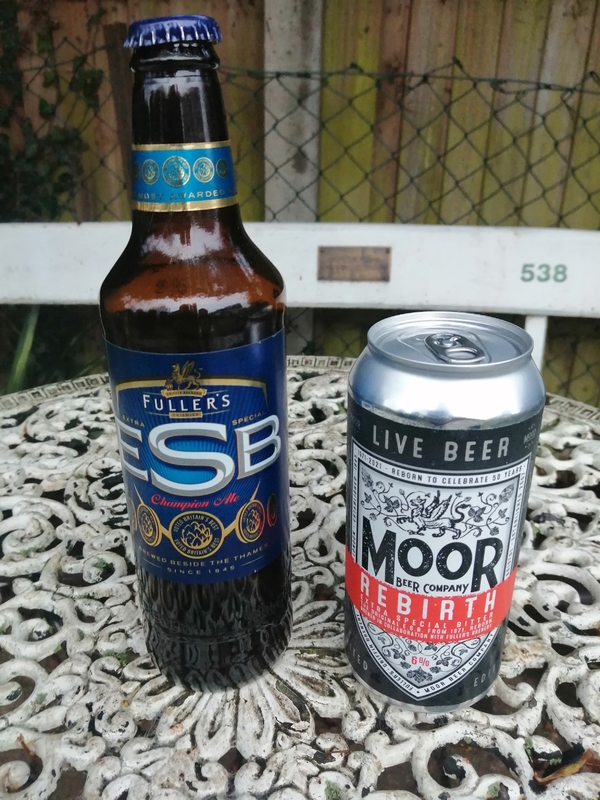ESB at 50: rolling back the years
Added: Sunday, December 19th 2021

Fuller’s ESB, one of the world’s most celebrated beers, is 50 years young. It was launched in 1971 and the brewery has joined forces with Moor Beer to create a version of the strong bitter using the original recipe.
Moor Rebirth was planned by Justin Hawke in close collaboration with Fuller’s of Chiswick. Justin is based in Bristol with a second plant in Bermondsey, south London. He’s an American from California who fell in love with British cask ale and was keen to mark ESB’s 50th birthday.
“1971 was not only the year ESB was launched, but it was also when CAMRA was founded – and it’s also the year I was born!” he says.
ESB stands for Extra Special Bitter and it has impressive credentials. It has been named CAMRA’s Champion Beer of Britain three times and has won the competition’s Strong Ale category no fewer than seven times.
It has achieved such fame as a result of Fuller’s export drive that many brewers in the United States produce beers they label ESB. American beer competitions have a category called ESB but Fuller’s take prompt legal action if any British competitor infringes its trademark.
The beer started life as Old Burton at a time when many brewers produced strong ales inspired by the popularity of those from the famous brewing town of Burton-on-Trent. Old Burton was sold in both Fuller’s and Whitbread’s pubs but when sales declined it was replaced by an annual Winter Ale.
This proved so popular that it was renamed ESB and launched in 1971. It was brewed all year round and rapidly became one of Fuller’s most popular beers. Over the past 50 years, the recipe has been tweaked several times and in 2004 ESB was given a major overhaul when the brewery recorded a decline in sales.
Market research revealed that many drinkers thought the beer – 5.5 per cent on draught and 5.9 per cent in bottle – was too strong. Head brewer John Keeling and his team tackled the problem by retaining the strength but extended the time the beer matures. Following fermentation, the beer rests for 21 days in conditioning tanks on a deep bed of Goldings hops. The result is an increased peppery hop note that balances the beer’s intense fruitiness.
ESB today is brewed with pale and crystal malts and is hopped with Challenger, Goldings, Northdown and Target English hop varieties. It’s late hopped in the boiling copper with Challenger and Northdown, and then matured over Goldings. Goldings are then used to “dry hop” the beer in cask for additional aroma and bitterness: dry hopping means a handful of hops are added to casks before they leave the brewery. The finished beer has 34 units of bitterness.
When Justin Hawke researched the beer for Rebirth, he found the original 1971 recipe was radically different to the current one.
“As well as pale and crystal malts, maize was used, but that has since been dropped,” he says. “John Keeling said the maize allowed the malt to open up and breathe and so I used it with pale, crystal, chocolate and wheat malts.
“The original hop mix had British, American, Australian and Slovenian varieties so for Rebirth I used First Gold from the UK, Crystal from the US, Vic Secret from Australia and Styrians from Slovenia. The beer has 50 IBUs.”
Fuller’s ESB today is a pale copper-coloured beer with rich malt, marmalade fruit and peppery hops on the aroma with a big attack of juicy malt, orange peel and bitter hops on the palate. The deep, complex and lingering finish is balanced between malt, hops and tangy fruit, finally becoming dry with bitter hop notes.
Rebirth (6 per cent) clearly comes from the same seed bed. It has a similar orange marmalade aroma with honeyed malt and peppery and floral hops. Bitter hops build on the palate but they are balanced by rich grain and tart fruit. The long finish is bittersweet with a fine mix of ripe fruit, honeyed malt and peppery hops, segueing into a bitter and fruity finale.
ESB is available in cask-conditioned format in Fuller’s pubs. The bottled version is filtered and pasteurised. Rebirth comes in Moor Beer’s innovative “canned conditioned” form. Justin Hawke transformed the image of canned beer when he developed a system that allows beer to mature in can with live yeast – a method approved by CAMRA.
Rebirth is available from https://www.moorbeer.co.uk/shop.
It’s a limited edition so don’t delay ordering it.
John Keeling, now retired, says: “ESB was the first Fuller’s beer I drank and it made me want to work for them.” It has that affect on people.








